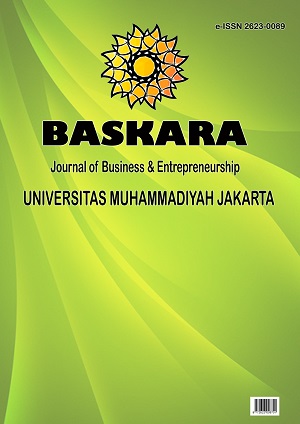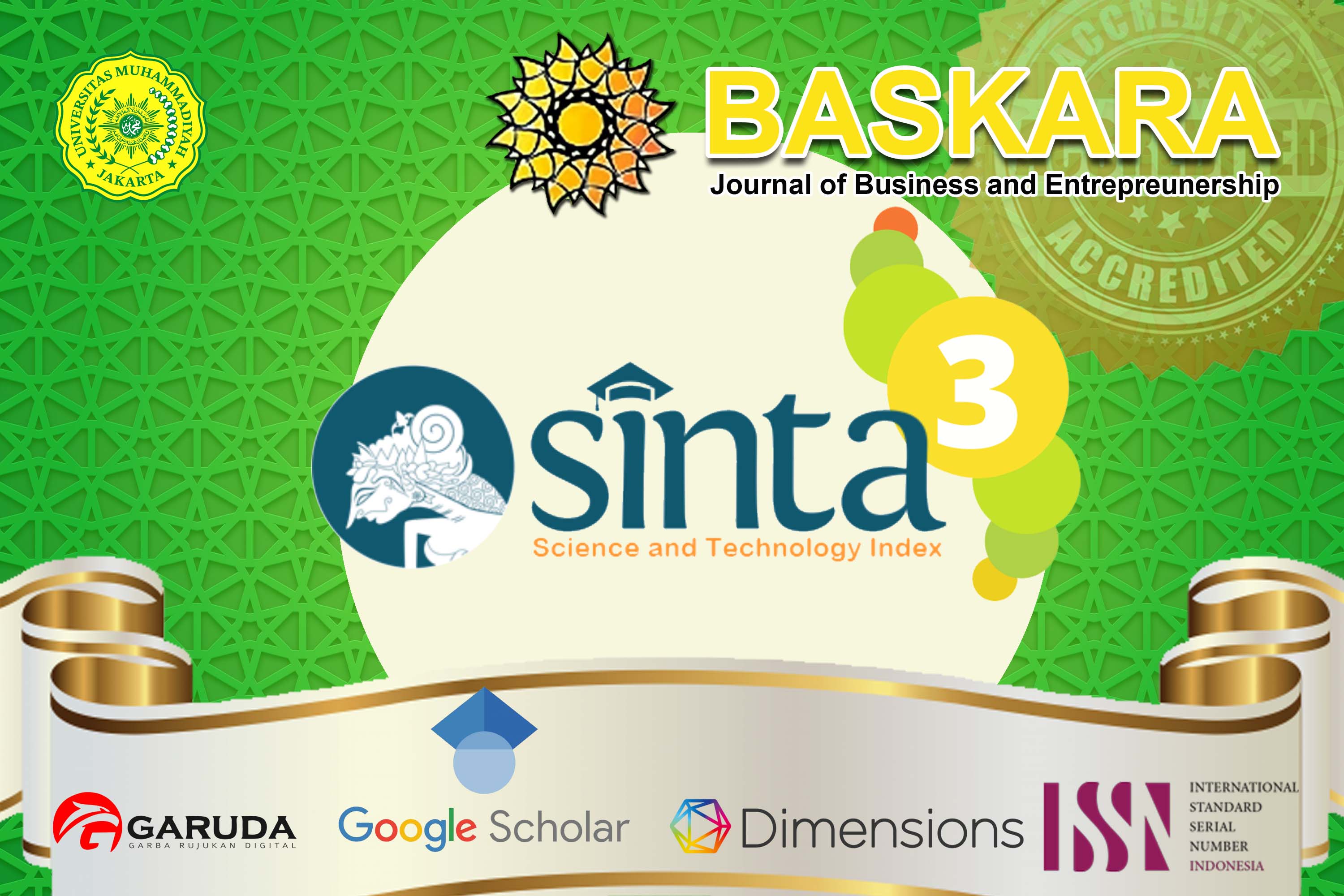Quality of Jakarta Smart Card Services in East Jakarta
DOI:
https://doi.org/10.54268/baskara.v4i1.9439Keywords:
Service Quality, Jakarta Smart CardAbstract
The purpose of this study was to determine the quality of service Jakarta Smart Card in East Jakarta. This study uses Home Visits Service Quality with indicator: Tangibles, Reliability, Responsive, Assurance, and Empathy. This method used is descriptive qualitative approach. Data collection is done by interview, observation, and documentation. Data analysis uses analysis models from Miles and Huberman, and data validity testing uses triangulation techniques from Moleong. The results of the study stated that the Quality of Smart Jakarta Card Services in East Jakarta has run according to Service Quality theory. Tangibles: facilities and infrastructure used by the school in carrying out the distribution and service of smart Jakarta cards to students is adequate, starting from the computerization and administration system. Reliability: the provision of services in Jakarta Smart Card or operator friendly and efficient in providing services, related to the provision of information about Jakarta Smart Card. Responsive: The school always helps and directs students and parents to all forms of services related to the Jakarta Smart Card and from the results of interviews and observations it can be seen that the operator provides services to students and parents quickly, accurately and responds according to the aspirations of the needs. Assurance: Jakarta Smart Card services are supported by the government. and Empathy: giving or distributing the assistance of the Jakarta Smart Card to students at the Ar-Raisiyah Pharmacy Vocational School in East Jakarta, namely by providing assistance to students who are truly financially unable to reach the target. But in terms of timeliness is still lacking. Needed speed up the thawing process Jakarta Smart Card. Conclusion: Jakarta Smart Card of sufficient quality service.References
Afriansyah, A. (2017). Implementasi Program Kartu Jakarta Pintar di DKI: Peluang dan Tantangan Dalam Pemenuhan Keadilan Sosial di Bidang Pendidikan. Jurnal Kependudukan Indonesia, 12(1), 55. https://doi.org/10.14203/jki.v12i1.196
Driana, E., Merawati, D., & Ghani, A. R. A. (2018). Evaluation of the Implementation of Jakarta Smart Card Program in a Private School in West Jakarta. JKP. Jurnal Kepemimpinan Pendidikan, 1(1), 1–19. https://doi.org/10.22236/jkpuhamka.v1i1.3423
Galeeva, R. B. (2016). SERVQUAL Application and Adaptation for Educational Service Quality Assessments in Russian Higher Education. Quality Assurance in Education, 24(3), 329–348. https://doi.org/10.1108/QAE-06-2015-0024
Grönroos, C. (2019). Reforming Public Services: Does Service Logic Have Anything to Offer? Public Management Review, 21(5), 775–788. https://doi.org/10.1080/14719037.2018.1529879
Guida, C., & Carpentieri, G. (2021). Quality of Life in the Urban Environment and Primary Health Services for the Elderly during the Covid-19 Pandemic: An Application to the City of Milan (Italy). Cities, 110. https://doi.org/10.1016/j.cities.2020.103038
Gupta, P., & Kaushik, N. (2018). Dimensions of Service Quality in Higher Education – Critical Review (Students’ Perspective). International Journal of Educational Management, 32(4), 580–605. Emerald Group Publishing Ltd. https://doi.org/10.1108/IJEM-03-2017-0056
Kekez, A. (2018). Public Service Reforms and Clientelism: Explaining Variation of Service Delivery Modes in Croatian Social Policy. Policy and Society, 37(3), 386–404. https://doi.org/10.1080/14494035.2018.1436505
Lapuente, V., & Van de Walle, S. (2020). The Effects of New Public Management on the Quality of Public Services. Governance, 33(3), 461–475. https://doi.org/10.1111/gove.12502
Li, Y., & Shang, H. (2020). Service Quality, Perceived Value, and Citizens’ Continuous-Use Intention Regarding E-Government: Empirical Evidence from China. Information and Management, 57(3), 103197. https://doi.org/10.1016/j.im.2019.103197
Miles B., M., & Michael, A. H. (1994). Qualitative Data Analysis: An Expanded Sourcebook. SAGE Publications. https://books.google.co.id/books?hl=id&lr=&id=U4lU_-wJ5QEC&oi=fnd&pg=PA10&dq=miles+and+huberman+qualitative+data+analysis+&ots=kFTE0HVUYQ&sig=_DRsMGhyjTSOSDlGF83-GdjyKFc&redir_esc=y#v=onepage&q=miles and huberman qualitative data analysis&f=false
Moleong, & Lexy, J. (2004). Metodologi Penelitian. Remaja Rosdakarya.
Sari, A. Y. A., & Hudaya, A. (2017). Efektifitas Program Kartu Jakarta Pintar di SMKN 19 Jakarta. Research and Development Journal of Education, 3(2). https://doi.org/10.30998/rdje.v3i2.1979
Tuti, R. W. (2019). Service Quality (Servqual) Toward Rawa Bebek Flats Residents in DKI Jakarta. Journal of Governance and Public Policy, 6(3).
Voorberg, W., Bekkers, V., Timeus, K., Tonurist, P., & Tummers, L. (2017). Changing public Service Delivery: Learning in Co-Creation. Policy and Society, 36(2), 178–194. https://doi.org/10.1080/14494035.2017.1323711
Wang, C., & Teo, T. S. H. (2020). Online Service Quality and Perceived Value in Mobile Government Success: An Empirical Study of Mobile Police in China. International Journal of Information Management, 52(January), 102076. https://doi.org/10.1016/j.ijinfomgt.2020.102076
Zedadra, O., Guerrieri, A., Jouandeau, N., Seridi, H., Fortino, G., & Spezzano. (2019). Democratic System Strengthening through Concurrent Election Implementation to Improve Political Stability and National Development. Sustainability (Switzerland), 11(1), 1–14. http://scioteca.caf.com/bitstream/handle/123456789/1091/RED2017-Eng-8ene.pdf?sequence=12&isAllowed=y%0Ahttp://dx.doi.org/10.1016/j.regsciurbeco.2008.06.005%0Ahttps://www.researchgate.net/publication/305320484_SISTEM_PEMBETUNGAN_TERPUSAT_STRATEGI_MELESTARI
Downloads
Published
Issue
Section
License
In order for Baskara: Journal of Business and Entrepreneurship to publish and disseminate research articles, we need publishing rights (transfered from author(s) to publisher). This is determined by a publishing agreement between the Author(s) and Baskara Journal. This agreement deals with the transfer or license of the copyright of publishing to Baskara: Journal of Business and Entrepreneurship, while Authors still retain significant rights to use and share their own published articles. Baskara : Journal of Business and Entrepreneurship supports the need for authors to share, disseminate and maximize the impact of their research and these rights, in any databases.
As a journal Author, you have rights for a large range of uses of your article, including use by your employing institute or company. These Author rights can be exercised without the need to obtain specific permission. Authors publishing in Baskara : Journal of Business and Entrepreneurship have wide rights to use their works for teaching and scholarly purposes without needing to seek permission, including:
- use for classroom teaching by Author or Author's institution and presentation at a meeting or conference and distributing copies to attendees;
- use for internal training by author's company;
- distribution to colleagues for their reseearch use;
- use in a subsequent compilation of the author's works;
- inclusion in a thesis or dissertation;
- reuse of portions or extracts from the article in other works (with full acknowledgement of final article);
- preparation of derivative works (other than commercial purposes) (with full acknowledgement of final article);
- voluntary posting on open web sites operated by author or author’s institution for scholarly purposes.
Copyright Transfer Agreement for Publishing (Publishing Right)
The Authors who submit manuscript has to understand that if accepted for publication, mean that all copyright and publishing right of the article shall be assigned/transferred to Baskara: Journal of Business and Entrepreneurship as assigned publisher.
- CC BY-NC: This license allows reusers to distribute, remix, adapt, and build upon the material in any medium or format for noncommercial purposes only, and only so long as attribution is given to the creator.
It includes the following elements:
BY ![]() – Credit must be given to the creator
– Credit must be given to the creator
NC ![]() – Only noncommercial uses of the work are permitted
– Only noncommercial uses of the work are permitted
Baskara (C) Copyright (2022):
BASKARA: Journal of Business and Entrepreneurship by https://jurnal.umj.ac.id/index.php/baskara
is licensed under a Creative Commons Attribution-NonCommercial 4.0 International License








